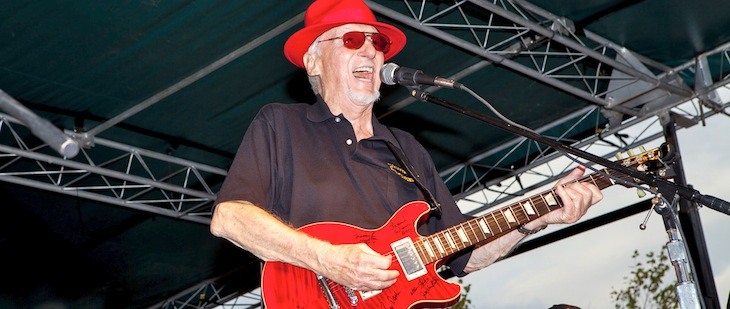Arkansas mourns the loss of rockabilly music legend Sonny Burgess
by August 21, 2017 7:23 pm 791 views

Sonny Burgess
When Henry Boyce entered kindergarten, he instantly befriended a boy named Payton. The two rode bikes together, went fishing, and on occasion they stayed the night together.
Hidden within Payton’s house was an array of expensive musical instruments and equipment. Payton’s father, Sonny Burgess didn’t allow the boys to play with the equipment. Burgess didn’t play music in those days, but Boyce knew he was a musician.
He saw his name on records in their house.
The 88-year-old rockabilly legend passed away Friday night in Little Rock. He had fallen and injured himself a few months ago, and suffered from diabetes. His death means Jackson County may have lost its most important cultural icon, Boyce told Talk Business & Politics. Boyce is the prosecutor in the Third Judicial District, and is a local music historian.
“I can’t think of a larger cultural presence in this town (Newport) or this county,” Boyce said. “Sonny was a unique individual and a very talented musician.”
Burgess was born May 28, 1929 in Jackson County. He excelled at baseball, and spent a stint in the minor leagues, Boyce said. After he graduated from high school, Burgess served several years in the Army before returning to Newport. By 1955 he formed a band known as the “Moonlighters,” a tribute to the Silver Moon Club, the largest and most lavish nightclub in Newport. In October of that year he performed at the club with another up and comer – Elvis Presley.
A year later the band had renamed itself “The Pacers” and signed with Sun Records in Memphis, then owned by music icon Sam Phillips. The band cut five singles with Sun Records. The two standout songs from that era were “Red Headed Woman,” and “We Wanna Boogie.” They toured with other musicians such as Presley, Johnny Cash, Jerry Lee Lewis, Patsy Cline, Conway Twitty, and others.
Despite modest success, The Pacers disbanded in 1958. Some members of the band were married, while others were single. The conflicting schedules and lifestyles made it hard for the original group to stay together, Boyce said. Burgess continued to play through the 1960s, but his musical career never rose to the levels of Presley, Cash, Lewis, and others.
A combination of factors were responsible, Boyce said. The rockabilly sound wasn’t as popular as rock or country with American audiences. Presley had iconic talent, unmatched by anyone during that era. Cash consistently produced top hit songs, and eventually became a country music stalwart. The British band invasion in the early 1960s negatively impacted many American musicians and bands. And one other factor worked against Burgess.
“It’s luck. It’s simple luck sometimes,” Boyce said. “In life we all make decisions, and Sonny chose to be a strong family man and raise his family during that time. It’s hard to be on the road playing late-nights and be there for your family.”
By 1970 the lead guitarist had moved on from his musical career. He got a job as a traveling salesman with a fabric company. He raised his children and at one point he opened a sporting goods store in Newport. In his spare time, Burgess was an avid reader and always had a book in his hands, Boyce said. One of his favorite authors was Louis L’Amour. Despite his musical background, Burgess was a normal, down to Earth guy, Boyce said. He kept up with the news and you could have an intellectual conversation with him about numerous topics.
“He was largely a product of popular American culture,” Boyce said.
The rockabilly-style music may have only had a niche market in the United States, but it along with other 1950s music exploded in popularity in Europe during the 1980s. Another rockabilly legend, Billy Lee Riley, began to get calls from agents in Europe. Riley, a Pocahontas native born into a sharecropper family, had also been with Sun Records at the same time as Jerry Lee Lewis. When Lewis’s song “Great Balls of Fire” became a mega hit, Phillips opted to put his advertising budget into Lewis, and a scorned Riley left the studio and ultimately ended up doing music work in Los Angeles.
When those agents called, he contacted his old Sun colleague, Burgess. He along with other 1950s legends began to tour Europe. Throngs of young, avid fans met them at every stop. It was the beginning of a new, decades long love-affair between Burgess and his music. He played at 100 shows each year up until he was in his mid-80s, Boyce said. He is a member of the European Rock-n-Roll Hall of Fame.
The music genre’s popularity started to grow in the U.S. once more, too. Burgess re-formed his band, and named it Sonny Burgess and The Legendary Pacers. Each year the group performed at Depot Days, a long-standing music festival in Newport that will celebrate its 20th anniversary in September. The group was inducted into the Rockabilly Hall of Fame in 2002.
It will be strange hosting Depot Days without its signature act present, Boyce said. During the last 47 years he got to know Burgess well, and they became good friends, he said. There’s one thing he knows for sure – Burgess would want them to play on.
“He was a persistent warrior … he never gave up,” Boyce said.
